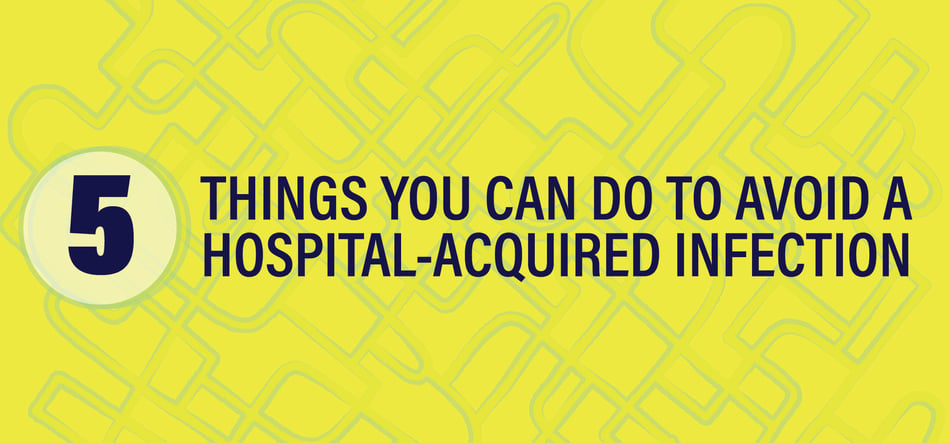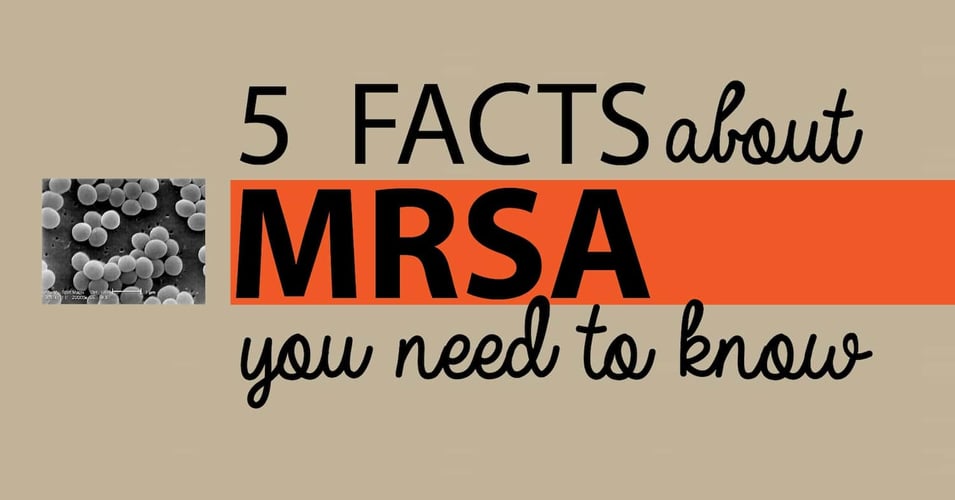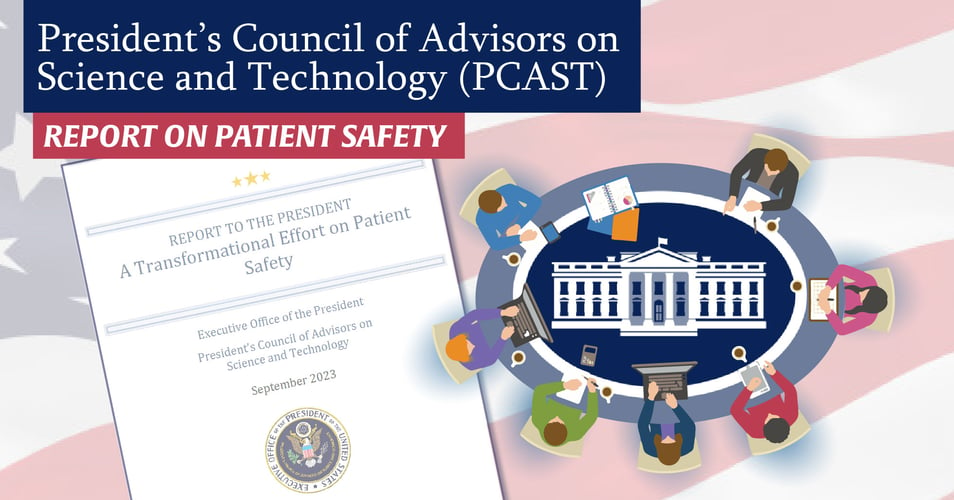5 Things You Can Do To Avoid A Hospital-Acquired Infection

The idea of going to the hospital can be scary enough without even thinking of the possibility of getting a hospital-acquired infection (HAI). However, there are a few things you can do to reduce your risk of getting an infection while recovering in a hospital or other healthcare facility, especially when you are being admitted for a planned procedure with advance notice. These are 5 quick steps you can take to help you and your health care team.
When we are faced with a hospital stay - even for a routine procedure - we are confronted with a situation in which we have to put our lives in the hands of someone else. Thankfully, we have the opportunity to make important decisions about our healthcare that can improve our outcomes. These decisions can impact our chances of being exposed to a hospital acquired infection such as MRSA or CRE. Save these tips for you or a loved one should a hospital stay become a necessity.
As with any health advice, please review these tips with your doctor to make sure you make the best decisions for your health care.
#1: Know Your Hospital's Infection Score
Many of us do not have a choice when it comes to which hospital provides our health care. Whether or not you can choose where to have your procedure, it is always a good idea to know what the hospital's infection score is before you step through those sliding doors. There are a number of reputable web sites that can provide those statistics, down to the type of infection. Here are our picks for the best free sites:
Hospital Safety Score: Free | Must accept Terms of Use. Data collected and housed by the Leapfrog Group, a non-profit organization that conducts an annual survey of hospitals. Interface is user-friendly and results in a report card score from A to F. You can search by geographic location or hospital name, and see multiple years of scores for each hospital. There is an overall hospital score as well as five additional categories, each of which is further broken down into subcategories. Under "Infections and Safety Problems," the user can see how the hospital compares to the "best", "average", and "worst" hospital scores for the following infections: Central line, UTI, and surgical site after colon surgery.
Hospital Compare: Free | No conditions. Data collected and housed by Medicare.gov. The user selects up to three hospitals to compare based on seven main categories, including the survey results to the Hospital Consumer Assessment of Healthcare Providers and System. No overall score is provided. Under "Readmissions, complications, and deaths," the user can see how each hospital compares to the US National Benchmark on a variety of infections.
#2: Take A Shower Before Admission
The first step in infection control is reducing the bioburden - the collection of germs that we carry around with us on our bodies and that surrounds us in our environment. These bacteria are everywhere and typically produce no life-threatening problems to healthy individuals. However, a hospital procedure will make the patient more vulnerable to infection. Incisions, devices, and even some medications make our risk of infection higher. Therefore, hospitals advise taking a shower the night before a procedure as well as the day of a procedure. Typical recommendations include using an antiseptic soap, sleeping in just-washed bedding and clean pajamas, and dressing in just-washed clothing the day of the procedure.
#3: Practice Telling People to Wash Their Hands
This is very difficult! In our society and culture, asking someone to wash their hands can feel insulting, awkward, or rude. You may also be worried that your medical care will suffer if one of your healthcare workers is upset with you. However, the number one way to reduce HAIs is excellent hand hygiene: Hand-washing. Many doctors and healthcare workers will be very open about hand-washing, even telling you to ask them to wash their hands at any time. They want to break down the social barriers you may feel. The fact of the matter is, however, that healthcare workers are human beings and prone to all the human errors we all make, including forgetting to wash hands. All this doesn't mean that your role won't be a challenge. The best preparation is practice and visualization. To practice, come up with a few ways of phrasing the request and then try them out on your friends and family To visualize, simply sit with your eyes closed and imagine yourself asking a nurse or doctor to wash her/his hands in a variety of ways. This site has some great suggestions for getting out the words that could save your life (or shorten your hospital stay). Oh, and don't forget to wash your OWN hands!
#4: Know Your Risks
Certain procedures and treatments will heighten your risk of getting an HAI. If you know this in advance, you can play a role in monitoring your own recovery and become a valuable member of your healthcare team. Any time you have an opening in your skin - from a tiny IV drip hole to a surgery incision - bacteria have a way into your body. Further risks are involved if you have certain medical devices: Central lines (for medicine or blood samples), ventilators, and catheters are especially notorious for HAIs. If you encounter any of these scenarios, your infection risks are higher.
#5: Speak Up and Ask Questions
You are a valuable member of your healthcare team. Along with that position comes the responsibility to speak up when you have any concerns and act as a "reminder service" for your team. It can be very difficult to question a health care professional - you don't want to insult them, make them think you don't trust them, or annoy them. However, you are in a unique position to provide them with critical information about your body. If you feel that a medical device is out of place, uncomfortable, or loose - speak up. If you feel your IV drip site is not clean, or that your wound dressings are not clean, or feel any changes in your body - speak up. One of the easiest ways for the hesitant patient is to phrase your concern as a question: "If I used the restroom and got water on my IV drip, should I have it cleaned?" or "Could you check if my catheter has shifted? It feels different." The Centers for Disease Control and Prevention (CDC) has excellent patient resources for the following HAIs (scroll down to find "What can patients do" for each of the following): Central Line Infections, Catheter-Associated Urinary Tract Infections, Surgical Site Infections, and Ventilator-Associated Pneumonia. If you will be unable to play as active a role as you would like, ask for help. Your friends and family may be able to help, but there are also patient advocacy groups who can support you.
Illness, disease, and injury can make us feel out of control and at the mercy of fate. While any outcome can not be guaranteed, these five steps can help reduce your chances of getting an infection while receiving treatment at a hospital or healthcare facility. Together with your medical team, your family and friends, you can play a role in your recovery!
Editor's Note: This post was originally published in May 2015 and has been updated for freshness, accuracy and comprehensiveness.
![EOScu Logo - Dark - Outlined [07182023]-01](https://blog.eoscu.com/hubfs/Eoscu_June2024/Images/EOScu%20Logo%20-%20Dark%20-%20Outlined%20%5B07182023%5D-01.svg)

![[infographic] What are HAIs? Download and share!](https://no-cache.hubspot.com/cta/default/216314/interactive-179239629650.png)



